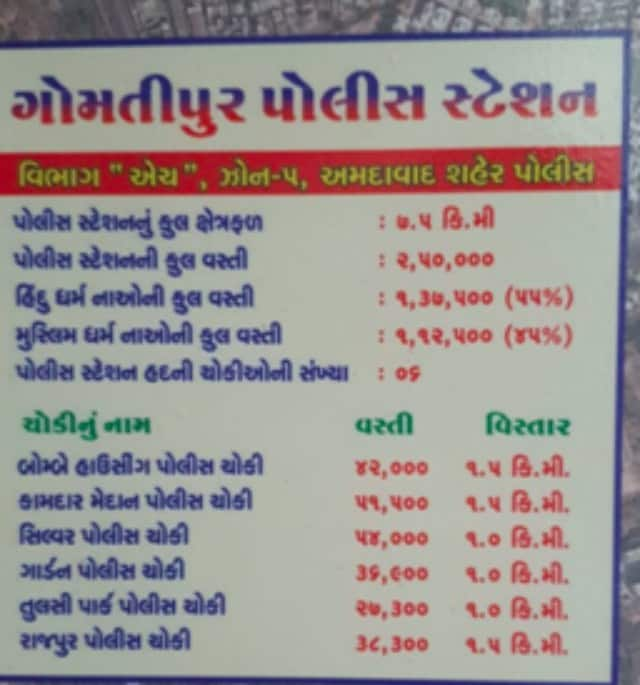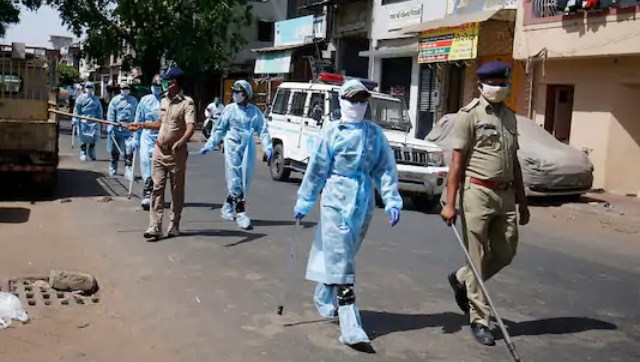The police needs clean localised data to formulate strategies on where to increase patrolling and where to be stricter in enforcing the lockdown.
The coronavirus outbreak has brought to the fore several challenges of urban governance in India. One of the lessons that we must learn from dealing with the outbreak is the importance of data management for authorities at the city-level. What would it be like if the only data on COVID-19 that people living in New Zealand had was the total number of cases in the country; with no data on cases in individual cities or neighbourhoods? Sounds absurd, doesn’t it? Ahmedabad, with a population comparable to New Zealand, functions with very little localised data that can be of use to political leaders and bureaucrats. Death rates, for example, are mostly reported at the city level, and little attention is paid to ward-wise variations. However, the authors of this article were able to gather detailed information on one zone till 15 June. Ahmedabad, till then, had a death rate of 7 percent (700 deaths per 10,000 clinically confirmed COVID-19 patients). But disaggregated data shows that some areas in the city had much higher death rates than the city’s average. One of these areas, zone 5, had a death rate of 12.08 percent, and a locality within the area (Gomtipur) had a death rate of 23.47 percent — that is, over three times the city’s average. The area within the Gomtipur police station limits also had the highest percentage of deaths (26.97 percent) among the eight police station areas in zone 5.
![ahmedabad-figure-640]()
The experience of Gomtipur, as described in more detail below, illustrates the harmful implications of centralised reporting and planning. It also highlights how confusion about the physical jurisdictions of various administrative units can impede proper collection of official data. But first, some basic facts. Ahmedabad, a city with a population of about 55 lakh, is divided into 48 wards and 45 police station limits. There are four elected corporators for every ward. Each ward and police station has a population of about 1.75 lakh to 2 lakh on an average. However, decentralisation has largely not happened below the zone level in both the civic body and the police force. This means that there are uniform protocols to deal with an average population of about 17-18 lakh. To make matters more complicated, the physical boundaries of wards do not overlap with those of other administrative units, like the police station. This is so in most other parts of the country too. Such a structure means that sometimes, a corporator has to co-ordinate with two or three police stations, and a police station has to co-ordinate with around 12 corporators (if there are three wards involved). In the absence of formal processes, co-ordination between these administrative units is dependent on informal relations. However, in times like these, such co-ordination is of utmost importance to ensure proper allocation of resources. Such boundaries make it difficult to collate data on cases and deaths at the ward level or police station level. The police often use such data to increase patrolling and monitoring via drones, and being stricter in areas that have more cases. The civic body’s data on COVID-19 cases is compiled ward-wise. So, at the police station level, this data has to be worked on again. The police have to procure data on cases that fall within the limits of neighbouring police stations, and exclude certain data of cases within their own police station limits. For example, the Gomtipur police station has to exclude cases from the roads which do not fall under its jurisdiction, but fall within the limits of neighbouring police stations of Rakhial and Nikol. Next, the police station also has to procure information from neighbouring police stations to include cases that are in their jurisdiction but may not be in the data of the ward office. After this effort, the data may still be unclean and may have overlaps. We made an effort to understand what formal sources of data are available to the police stations. Existing data, like figures from the Census, is available at the ward level, and not at the police station level. The only data available at the police station level is population, and the religion-wise population of Hindus and Muslims. Curiously, the religion-wise figures of Hindus and Muslims add up to 100 percent, although there is a significant Christian population in the area too. Data regarding caste, gender and age group is not available at the police station level. [caption id=“attachment_8628951” align=“alignnone” width=“640”]
 The only data available at the police station level is total population and the share of Hindus and Muslims in the population. Image: Ajaz Shaikh[/caption] One of us (Ajaz) experienced some of the complications that occurred due to different administrative boundaries first-hand. He was a member of a donor organisation that was distributing food packets and ration kits with the help of the police. There were 50 migrants in the Chakodia Mahadev area living on the footpaths. The Gomtipur police station initially helped with the distribution, but the process had to be stopped when it became clear that the area fell within the jurisdiction of the neighbouring Rakhial police station. On the other hand, there were about 14 migrants who lived in the Rakhial-Saraspur ward limits, but in Gomtipur police station boundaries. In the past few months, the police has been given several responsibilities, including enforcing the lockdown, providing protection to health workers, ensuring positive cases remain quarantined, etc. In addition, police officials have also been escorting migrant labourers and homeless people to shelter homes, and co-ordinating the distribution of food and ration supplies. Listening to their stories would help achieve better co-ordination at the lower levels of the bureaucracy. While some may view decentralisation as messy, the way forward is to trust the lower rungs of governance, listen to them and give them autonomy. Ajaz Shaikh is a PhD student at Gujarat University, Ahmedabad and R Advaita is a PhD student at Indian Institute of Management, Ahmedabad. The authors would like to thank Vipul Paikra and Ankur Sarin for their comments and suggestions in drafting this piece. Views expressed are personal.


)

)
)
)
)
)
)
)
)



